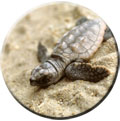- One-Stop-Shop Film Permitting Center
- Apply for a Permit
- Apply4 Permitting Tutorial
- Virtual Online Tours
- Permitting Information Center
- Insurance Requirements
- Search Locations
- List Your Property as a Film Location
- Production Resources
- Production Directory
- Sound Stages and Studios
- Job Listings
- Film Festivals
- Grants and Other Funding
GET FOCUSED on Miami

Marine Turtle Nesting Season
Filming on the Beach during Marine Turtle Nesting Season
Sea Turtle Nesting Season is upon us once again. Nesting Season began May 1st and lasts until October 31st.
Following are some important guidelines to protect the Turtles:
During nesting season, the nests of sea turtles can be buried anywhere on the beach. After an incubation period of from 45 to 70 days, small turtles, or hatchlings, make their way to just below the sand surface. The hatchlings can remain right at the surface during the day, awaiting night when they scurry across the sand to the water.
To ensure protection of both nests and hatchlings, activities involving vehicles, construction of temporary sets, explosions, and other potentially harmful actions are not permitted on the beach during sea turtle nesting and hatching season.
Specific Requirements:
The DEP Office of Beaches and Coastal Systems issue permits for activities on the beach. However, if turtle concerns are an issue, the applicant and the DEP will coordinate with the Florida Fish & Wildlife Conservation Commission (FWC). The following are specific issues and concerns raised by the DEP:
Night Filming During Nesting Season:
The Department of Environmental Protection (DEP) strongly discourages nighttime filming on nesting beaches during the nesting season. Options that exist for nighttime shots include filming at beaches that face bays rather than the ocean. Nighttime filming is a concern because:
1. The lights from filming can disorient nesting female and hatchling turtles (causing them to crawl toward the lights rather than the ocean, where they can succumb to predators, become trampled or run over, or die of dehydration).
2. The noise and activity on the beach from a filming event can disturb nesting females, causing them to abandon their nesting attempt.
3. The potential for nest crawls to be obscured and hatchlings to be crushed exists when the film crews are working in the dark.
However, the DEP will consider quiet filming conducted with night vision equipment and without lights (as found in some nature films). If the filming is of turtles, a letter of permission from the FWC is required. Use of lights during the daytime hours (between sunrise and sunset) is perfectly acceptable.
Structures/Props On The Beach:
Structures on the beach during the marine turtle season are not totally out of the question. The following basic precautions would minimize the potential harm to turtles:
1. The structure can be placed on the beach without any excavation or digging of the sand, or use of equipment heavier than an ATV.
2. The beach has an ongoing turtle nesting survey in which all nests are being marked. The applicant has the turtle survey person on site during structure placement.
3. The structure can be removed each night, and no materials are put out in the morning before the turtle survey is complete.
Special Effects, Stunts, and Miscellaneous Concerns:
The following are some concerns that the DEP has addressed in the past:
1. Pyrotechnics - fireworks, or other similar brief flashes of light of no more than a few seconds duration, are of minimal concern. They do not last long enough to disturb the turtles (though repeated flashes and noise could potentially disturb nesting females ).
2. Blazing fires can disorient nesting females and hatchlings. Each year we have several incidents of hatchlings crawling to their deaths into illegal bonfires on the beach. We generally do not permit fires at night during nesting season.
3. Driving on the beach, particularly heavy equipment or stunt car driving, is a concern. This has the potential to excavate sand, impact turtle nests, or leave ruts in which hatchlings can become entrapped. .
Time Limitations Or Constraints
Filming on the beach during turtle season is possible under some circumstances. The DEP will work with producers on a case-by-case situation.
Again, depending on the filming activity proposed, a special event permit or other form of approval may be necessary for filming on the beach, particularly during marine turtle nesting season. Please feel free to contact Robin Trindell, Florida Fish and Wildlife Conservation Commission, at 850-922-4330 for further information.
Home|Privacy Statement|Disclaimer |About
Miami-Dade |Agency
Directory |Contact Us
© 2024 Miami-Dade County. All rights reserved.
